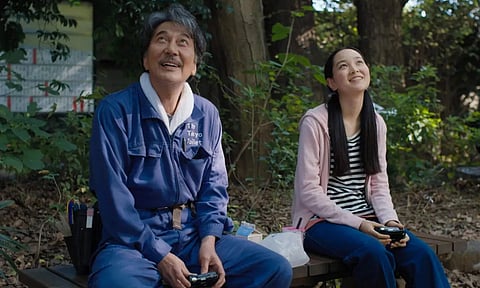

Wim Wenders’ Perfect Days ends with a plain but peerless shot—an extended closeup of its protagonist Hirayama (veteran Japanese actor Koji Yakusho) gently smiling, looking up at the sky with a mix gratitude and bliss, his face beautifully dappled with sunlight, listening to Nina Simone’s “Feeling Good”. A popular song that verbalizes the essence of his being: “It’s a new dawn, it’s a new day, it’s a new life, for me; And I’m feeling good”.
A sliver of eternal sunshine resides permanently in Hirayama’s spotless mind. He feels good every day as he wakes up with the sound of the cleaner’s broom on the street, neatly folds his bedding, stacks it in the corner of his small room that is filled with books and music cassettes besides his own solitary self, brushes his teeth, trims his moustache, mists his plants, wears his work gear, walks out of the door, looks at the sky, smiles, picks up a coffee from the vending machine and drives away in his van that is filled with varied contraptions to clean the toilets of Tokyo.
Life away from his job is just as regimented. Clicking pictures of trees during lunch break, a cycle ride to the public bath on returning home, dinner at favourite eatery and the day ending in the company of a book. On his days off work it’s the routine of laundry, library, and drinks with friends. With apologies to Samuel Beckett, in the uneventful life of Hirayama, “nothing happens, nobody comes, nobody goes”, but it’s certainly not “awful”. It’s all about finding contentment than being driven by covetousness, being happy with what one has than seeking it in what is not within one’s reach.
After Tokyo-Ga, the 1985 documentary on the legendary Japanese filmmaker Yasujiro Ozu, and another in 1989 called Notebook on Cities and Clothes, on fashion designer Yohji Yamamoto, the German filmmaker focuses on a mundane man, invisibalised in the urban jungle of Japan—a janitor—but manages to dredge out the poetic and philosophical from the prosaic. In fact, a dialogue in Tràn Anh Hùng’s The Pot au Feu, aka, The Passion of Dodin Bouffant, another film in the Palme d’Or section of the Cannes Film Festival, seems to resonate the underlying theme of fellow competitor Perfect Days: “Happiness is continuing to desire what we already have.” It’s about living in the moment and cherishing it. As Hirayama himself puts it: “Next time is next time, now is now”.
Wenders’ Perfect Days is a character study in which the narrative keeps pace with its protagonist, flowing meditatively, in tune with his calm, centred self. Like him, it’s uncomplicated but steadily cumulative in its impact. Every day is alike and yet not quite. There are newer facets of people and life that are revealed and the quirks of living alone are interrupted and challenged by an unexpected young visitor. Hirayama himself is not as rigidly defined as we might assume him to be. There is a sad past, regrets, the burden of estranged relations, a rare bond with an unseen stranger over a game of knots and crosses played in the folds of a paper tucked away in the toilet and unspoken feelings and desire for someone that bursts out once with a hint of jealousy.
There are several themes Perfect Days visits through Hirayama. Like practicing scrupulous work ethics than being self-serving. No surprise that the man who cleans the public waste with such devotion should also be a nurturer of life evident in his passion for plants. “How do you put in so much in a job like this?” he is asked by his younger wayward colleague Takeshi. It’s about the generation gap that invariably sets in as maturity rubs shoulders with callowness and eventually both gain from each other.
Veteran filmmaker Hrishikesh Mukherjee often used to quote Rabindranath Tagore on the essence of simplicity: “It is very simple to be happy, but it is very difficult to be simple”. Hirayama has clearly travelled a long way to arrive at the serenity he possesses, by paring down life to the bare necessities, finding mellowness by embracing a spartan lifestyle, eschewing cynicism for stoicism. Wenders’ filmmaking itself might be straightforward and minimal but rich in emotions and eloquent with meaning.
Yakusho’s face is like a canvas painted with fleeting expressions. A man of few words, his Hirayama barely ever speaks. There’s a quietude around him. The background score of his life is the popular English music he loves—Van Morrison, The Kinks’ “Sunny Afternoon”, Rolling Stones’ “Walking Through the Sleepy City” and most of all The Animals’ “House of Rising Sun”, and its wonderful Japanese version. The film even takes its title from Lou Reed’s “Perfect Day”.
However, much as I am haunted by him, I keep thinking of a Sahir Ludhianvi-Jaidev song from the 1961 Hindi film Hum Dono as the Hirayama anthem. It captures his Zen, resolved persona and inner equanimity: “Jo mil gaya usi ko muqaddar samajh liya, jo kho gaya main usko bhulata chala gaya...
Gham aur khushi mein farq na mehsoos ho jahan, main dil ko us muqaam pe lata chala gaya... (What I was bestowed with, I regarded as my good fortune and chose to forget all that I lost on the way... I tried to arrive at a stage in life where sadness and happiness felt no different from each other, leaving me unmoved by both).”
Perfect Days is a sublime validation of the ordinary, a film replete with grace, harmony, and hope that overwhelms and engulfs you in its humane world.